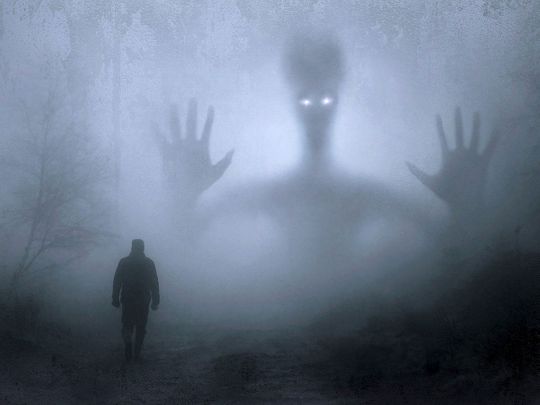
Ghosts, mediums, telepathy… the realm of the paranormal applies to anything beyond the range of scientific thinking.
Click start to play today’s Halloween-themed Word Search, where words like “chilling” and “wraith” place you in the dead centre of the paranormal zone.
What compels people to believe in the mysteries of the unknown? Even well-known scientists have been known to share theories of occult phenomena, despite their very work existing in the realm of tangible, quantifiable, definitive things.
Swiss psychiatrist and psychoanalyst Carl Jung was very outspoken about synchronicity, a term he used to describe meaningful coincidences that occur, or when things come together perfectly, exactly when we need them. Think of it like a wink from the universe! For instance, synchronicity occurs when you are experiencing an internal struggle and a song on the radio comes on that seems to be sending you a clear message.
Nobel-winning quantum theorist Wolfgang Pauli debated Jung for hours about his theory, and soon became convinced he was right. According to a report in US-based science magazine Scientific American, Pauli thought synchronicity might stem from a quantum effect that “weaves meaning into the fabric of nature.”
Coincidences aside, there are several other paranormal experiences that scientists refuse to discount.
Extrasensory perception (ESP), commonly known as the sixth sense, is when people sense information with their minds and not their five physical senses. British-American theoretical and mathematical physicist Freeman Dyson, who passed away last year, was convinced that ESP was a part of the human experience, but lay outside the limits of science. According to Dyson, there is no empirical proof of it since it is activated when a person undergoes extreme stress or strong emotions – it is therefore incompatible with controlled scientific procedures.
Another phenomenon, telepathy, is the act of transmitting information to one another without sensory channels or physical interaction, or in other words, mind-reading. According to the US-based Stanford Encyclopaedia of Philosophy website, British mathematician and cryptanalyst Alan Turing was a strong believer in telepathy and seemed to think there was overwhelming evidence for it, although he never explained what it was.
What do you think of paranormal phenomena? Play today’s Word Search and let us know at games@gulfnews.com.








